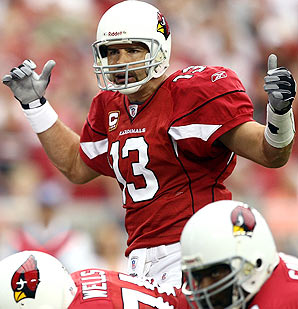Seeing Red: Is it possible to make a decision that is not "emotional"?
 Kurt Warner doesn’t want to make an emotional decision. Good luck with that.
Kurt Warner doesn’t want to make an emotional decision. Good luck with that.In a thriller last night in Arizona, the 38 year-old Quarterback threw for five touchdowns and 379 yards on 29 of 33 passing in a 51-45 victory over the Green Bay Packers. With that kind of performance, the talk around the absurdity of the veteran’s potential retirement swirled.
The flames were fueled in part by Warner’s victory lap around the stadium waving goodbye to the Arizona fans (albeit, it was his last home game of the season).
“Everybody, relax…” Warner said, “I never want to make an emotional decision,” Warner continued, “I think it’s easy to do, whether it’s after a game like this to say, ‘Ah, gosh, I’m going to play forever,’ or after a bad game just say, ‘Ah, I’m done.’ “
Statements like these make me see red. If Warner never wants to make an emotional decision, he’ll need to trade in his fleshy embodiment for a tin-can-souled robot version of himself. Warner is a normally functioning human without significant brain injury, and therefore, his decisions are necessarily influenced by emotion. We have at least 15 years of prominent research in the Decision Sciences showing the critical functional link between good decision making and emotion processing. In fact, in cases where patients with brain injury in areas of the pre-frontal cortex (responsible for higher-order processing of emotion) are damaged, decision-making capacities are severely hindered to the point of causing long-term detriment to the individual’s life (Damasio, 1994). Rational decision theorists scoff at the idea of emotion being central to good decision-making, but the fact is that the opposite of what traditional economic theory would say is true: we need emotion in order to make rational decisions for ourselves.
Even when we are not in a “hot-state”, our decisions are influenced by the emotion we anticipate feeling as we consider the potential outcomes of a decision. In the case of Warner, even after this season is over, his decision to return will depend on the emotions he feels when he considers returning for another season vs. retiring for good (e.g. the chance to win another championship vs. the chance of suffering another concussion). The anticipation of those emotions, and their actual strength while he is considering what to do, will weigh in on his decision to determine his course of action (Reid & Gonzalez-Vallejo, 2009).
The point here is not to beat up on Warner for saying that he doesn’t want to make an emotional decision, but rather to raise the question to our readership of why this sentiment is so common. Surely, we’ve all said the same thing, “I don’t want to be too emotional here.”, “I don’t want my emotions to cloud my judgment.”, “I can’t let my heart get the best of my mind.” etc., etc. ad nauseum.
So the questions of the day are:
What do we really mean when we say “I don’t want to make an emotional decision?”
If emotion is part and parcel of our daily decision-making, why do we live with this misperception that we can make decisions that are void of emotion?
Is it possible to make a decision that is not influenced by emotions in any way?
I’d love to hear your thoughts. But try not to get “too emotional” when you think about writing your response.
